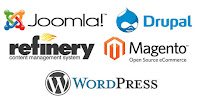A fair amount of confusion has been generated among laypersons (and even among techies!) as to what Content Management Frameworks and Online Website Builders are. And, for the purposes of the end product, they are pretty much similar. The end game is for a user to be able to maintain and update the content of a website, without the need for the user to know anything beyond how to type. Where the two differ, however, is the approach.
On to the comparisons!
Now before I get deeper into this, I want to make it clear that given a choice, I would rather not be using either a Content Management Framework or an Online Website Builder. Call me old-fashioned. I'm going to draw a few comparisons, but this is not going to be about their respective pros and cons. The simple reason being that, between Content Management Frameworks and Website Builders, there's no such thing as an absolute pro or con. It's all subjective. A pro can turn out to be a con depending on what you're looking for, and vice versa. As I'm so fond of saying, there are no blanket solutions in this business. You want a blanket solution, go look for Linus! |
| A blanket solution. |
What is a Content Management Framework?
This refers to a system which is a collection of resuable software components and modules, used to create websites and web applications. Notable examples are Joomla!, Wordpress, Drupal and Magento. Follow this link for a more comprehensive listing.Origins
Content Management Frameworks came about originally because some genius decided that customers should be able to update their content without the help of a developer, resulting in faster turnaround times. That certainly was the intention. Customers also found the prospect of not needing to pay maintenance packages to vendors highly attractive. Now they could change their minds every 30 minutes without being billed for it!The result, however, was that customers decided that the whole process of uploading and editing content was just too complicated and ended up offloading the work to developers anyway. And vendors began charging a premium for the installation of a Content Management Framework.
Another effect was that soon people with only HTML and CSS knowledge could make data-driven websites without knowing how to write scripts and manage databases. So technically-trained developers who were doing web development as their day job or even as a side hustle, now found a whole lot of competition flooding the market.
Hosting
A Content Management Framework is software which has to be installed on the user's hosting service of choice, including offline. In that respect, websites created from Content Management Frameworks are just like any other website. Hosting and domain name are handled by the user's provider of choice. This can be a burden, especially if there are upgrades available for the Content Management Framework. Choosing not to upgrade is not a viable choice, as this leaves the website open to security attacks. Think about it - if you could download the Content Management Framework software for free, so can everyone else. Chances are that the software you're using has already been scrutinized and reverse-engineered by hackers, and that security loopholes have been found. However, upgrading brings its own set of problems. After an upgrade, previously installed plugins may fail due to incompatibility.And if you made any changes to the core, God help you.

No comments:
Post a Comment